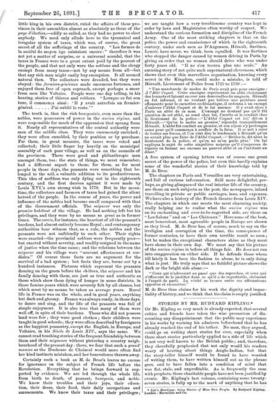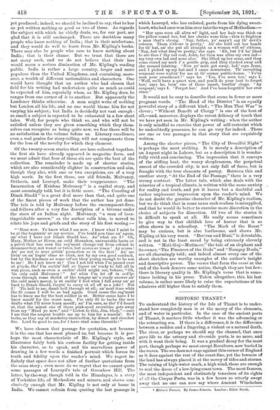STORIES BY MR. RUDYARD KIPLING.*
OF Mr. Kipling so very much is already expected, that several critics and friends have taken the wise precaution of dis- counting any disappointment that the public may experience in his works by warning his admirers beforehand that he has already reached the end of his tether. No man, they argued, could go on writing short stories for ever, especially when those short stories particularly applied to a side of life which is not very well known to the British public; and, therefore, they cheerfully prophesied that not only would his readers weary of hearing about things Anglo-Indian, but that the story-teller himself would be found to have wearied of writing them, to have written himself out as the phrase- goes, and to have fallen into a condition of mind that was flat, stale, and unprofitable. As is frequently the case with prophets, these charitable people have not been justified by events. Mr. Kipling's last volume, containing some twenty- seven stories, is fully up to the mark of anything that he has • Life's Handicap: being Stories of Hine Own Pend*. By Rudysrd Kipling: London : Macmillan and Co.
yet. produced ; indeed, we should be inclined to say, that he has as yet written nothing so good as two of these. As regards the subject with which he chiefly deals, we, for our part, are glad that it is still unchanged. There are doubtless many people who know nothing of India ; that is their misfortune, and they would do well to learn from Mr. Kipling's books. There may also be people who care to know nothing about India; that is their shame. But we trust that there are not many such, and we do not believe that their loss would mean a serious diminution of Mr. Kipling's reading public. India is rather a large country, larger and more populous than the United Kingdoms, and containing, more- over, a wealth of different nationalities and characters. One would have thought that an author who had chosen that field for his writing had undertaken quite as much as could be expected of him, especially when, as Mr. Kipling does, he ranges from one corner of it to another. But apparently the Londoner thinks otherwise. A man might write of nothing
but London all his life, and no one would blame him for not varying his subject; but India is decidedly not vast enough : so smell a subject is expected to be exhausted in a few short tales. Well, for people who think so, and who will not be -satisfied unless they are given something which they them- selves can recognise as being quite new, we fear there will be no satisfaction in the volume before us. Literary excellence,
even a real genius for story-telling, will not compensate them for the loss of the novelty for which they clamour.
Of the twenty-seven stories that are here collected together, the first six have already appeared in magazine form, and we must admit that four of those six are quite the best of the collection. The remainder is made up of shorter stories, which are also considerably slighter in construction and aim, though they also, with one or two exceptions, are of a very high merit. In the first three, our old friends, Mulvaney, Ortheris, and Learoyd, make their reappearance. " The Incarnation of Krishna Mulvaney " is a capital story, and most amusingly told, but it is little more.. "The Courting of Dinah Shadd " is a great deal more than that, and quite one of the finest pieces of work that the author has yet done.
The tale is told by Mulvaney before the encampment-fires, and follows after a very fine description of a bivouac under the stars of an Indian night. Mulvaney, " a man of inex- tinguishable sorrow," as the author calls him, is moved to relate his joys and griefs and the story of his first wooing :—
"' Hear now. Ye know what I am now. I know what I mint to be at the beginnin' av my service. I've tould you time an' again, an' what I have not Dinah Shadd has. An' what am I ? Oh, Mary, Mother av Elven, an ould dhrunken, untrustable baste av a privit that has seen the reg'ment change out from colonel to drummer-boy, not wanst or twice, but scores av times ! Ay scores ! An' me not so near gettin' promotion as in the first ! An' me livin' on an' kapin' clear av clink, not by my own good conduck, but by the kindness av some orf'cer bhoy young enough to be son to me ! Do I not know ut ?. Can I not tell whin I'm passed over at p'rade, tho' I'm rockin' full av liquor an' ready to fall all in wan piece, such as even a suckin' child might see, bekaze, "Oh, 'tis only mild Mulvaney !" An' whin I'm let off in ord'ly- room through some thrick of the tongue an' a ready answer an' the ould man's mercy, is ut smilin' I feel whin I fall away an' go back to Dinah Shadd, thryin' to carry ut all off as a joke ? Not I ! 'Tis hell to me, dumb hell through ut all ; an' neat time whin the fit comes I will be as bad again. Good cause the reg'ment has to know me for the best soldier in ut. Better cause have I to know mesilf for the worst man. I'm only fit to tache the new drafts what I'll niver learn mesilf ; an' I'm sure, as tho' I'd heard ut, that the minut one of those pink-eyed recruities gets away from my "Mind ye now," and "Listen to this, Jim, bhoy,"—sure I am that the sergint houlds me up to him for a warnin'. So I tache, as they say at musketry-instruction, by direct and ricochet fire. Lord be good to me, for I have stud some throuble !"
We have chosen that passage for quotation, not because it is the one that has most pleased us, but because it is per-
haps the most characteristic of Mr. Kipling's style, and illustrates fairly both his curious facility for getting inside his character, so to speak, and his marvellous power of drawing in a few words a finished portrait which forces its truth and fidelity upon the reader's mind. We regret in- finitely that space does not allow of further quotations from the same story ; even more do we regret that we cannot quote some passages of Learoyd's tale of Greenhow Hill. The
latter, by-the-way, though told in the Himalayas, is a story of -Yorkshire life, of Methodists and miners, and shows con- clusively enough that Mr. Kipling is not only at home in India. We cannot refrain from quoting the last passage in
which Learoyd, who has enlisted, parts from his dying sweet- heart, who had oncewon him over into the ways of Methodism:—
" Her eyes were all alive wi' light, and her hair was thick on the pillow round her, but her cheeks were thin—thin to frighten a man that's strong. Nay, father, yo' mayn't say th'
colours. Them ribbons is pretty.' An' she held out her hands for th' hat, an' she put all straight as a woman will wi' ribbons. Nay, but what they're pretty,' she says. Eh, but I'd ha' liked to see thee i' thy red Coat, John, for thou was alias my own lad— my very own lad and none else.' She lifted up her arms, and they come round my neck i' a gentle grip, and they slacked away and she seemed fainting. 'Now yo' min get away, lad,' says Jew, and I picked up my hat and I came downstairs. Th' recruiting sergeant were waitin' for me at th' corner public-house. Yo've seen your sweetheart ?' says he. Yes, I've seen her,' says I. Well, we'll have a quart now, and you'll do your best to forget her,' says he, bein' one of those smart, bustlin' chaps. Ay sergeant,' says I. Forget her.' And I've been forgettin' her ever since."
It would not be easy to describe that scene in fewer or more pregnant words. " The Head of the District" is an equally powerful story of a different kind ; " The Man That Was" is clever ; " Without Benefit of Clergy" is one of the best of all;—and, moreover, displays the rarest delicacy of touch that we have yet seen in Mr. Kipling's writing : when the author is only mindful to exercise that power of self-restraint which he undoubtedly possesses, he can go very far indeed. . There are one or two passages in that story that are exquisitely written.
Among the shorter pieces, " The City of Dreadful Night ".
is perhaps the most striking. It is merely a description of an August night in Lahore, but as a description it is wonder- fully vivid and convincing. The impression that it conveys of the stifling heat, the weary sleeplessness, the perpetual unrest of the crowded city, is not only full of force, but is fraught with the true elements of poetry. Beteieen this and another story, "At the End of the Passage," there is a very strong contrast. The latter tale, which also deals with the miseries of a tropical climate, is written with the same anxiety . for reality and truth, and yet it leaves but a doubtful and rather unpleasant impression upon the reader's mind. We do not doubt the genuine character of Mr. Kipling's realism, but we do think that in some cases such realism is misapplied, and that he would do better to exercise more discretion in the choice of subjects for dissection. Of two of the stories it is difficult to speak at all. He really seems sometimes to give way to that childish love of horror that is so often shown in a schoolboy. " The Mark of the Beast" may be curious, but is also loathsome, and shows Mr.
Kipling at his very worst. "Bertran and Bimi," is detestable, and is not in the least saved by being extremely cleverly written. " Moti-Guj—Mutineer," the tale of an elephant and its owner, "The Finances of the Gods" and "Namgay Doola," are all charmingly told ; and indeed almost every one of the short sketches are worthy examples of the author's insight and descriptive power. The verses that form the envoi at the end of the book deserve some notice, thOugh they are but few: there is literary quality in Mr. Kipling's verse that is some- times lacking in his prose. Taken altogether, this, his last volume, is rather more likely to raise the expectations of his admirers still higher than to satisfy them.



































 Previous page
Previous page